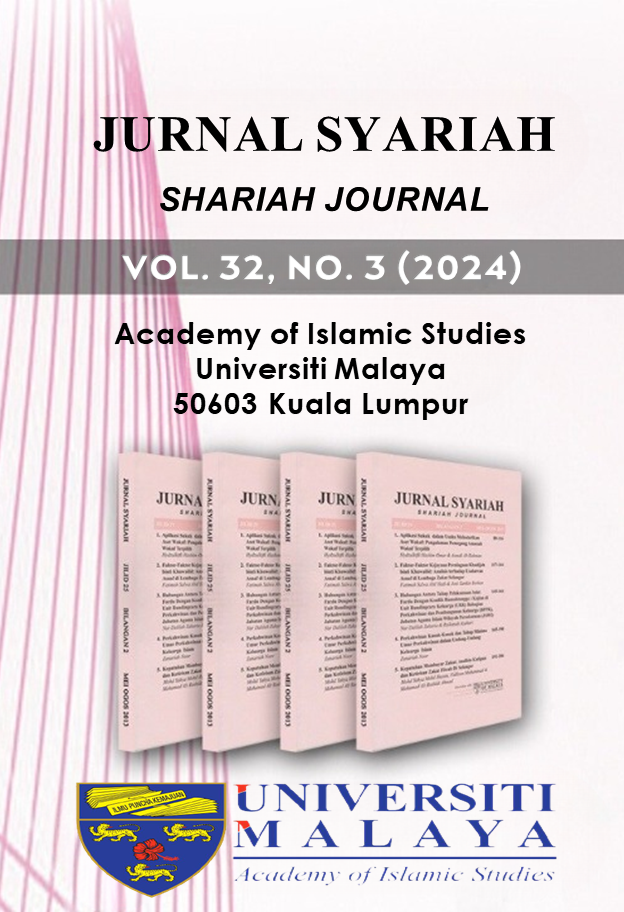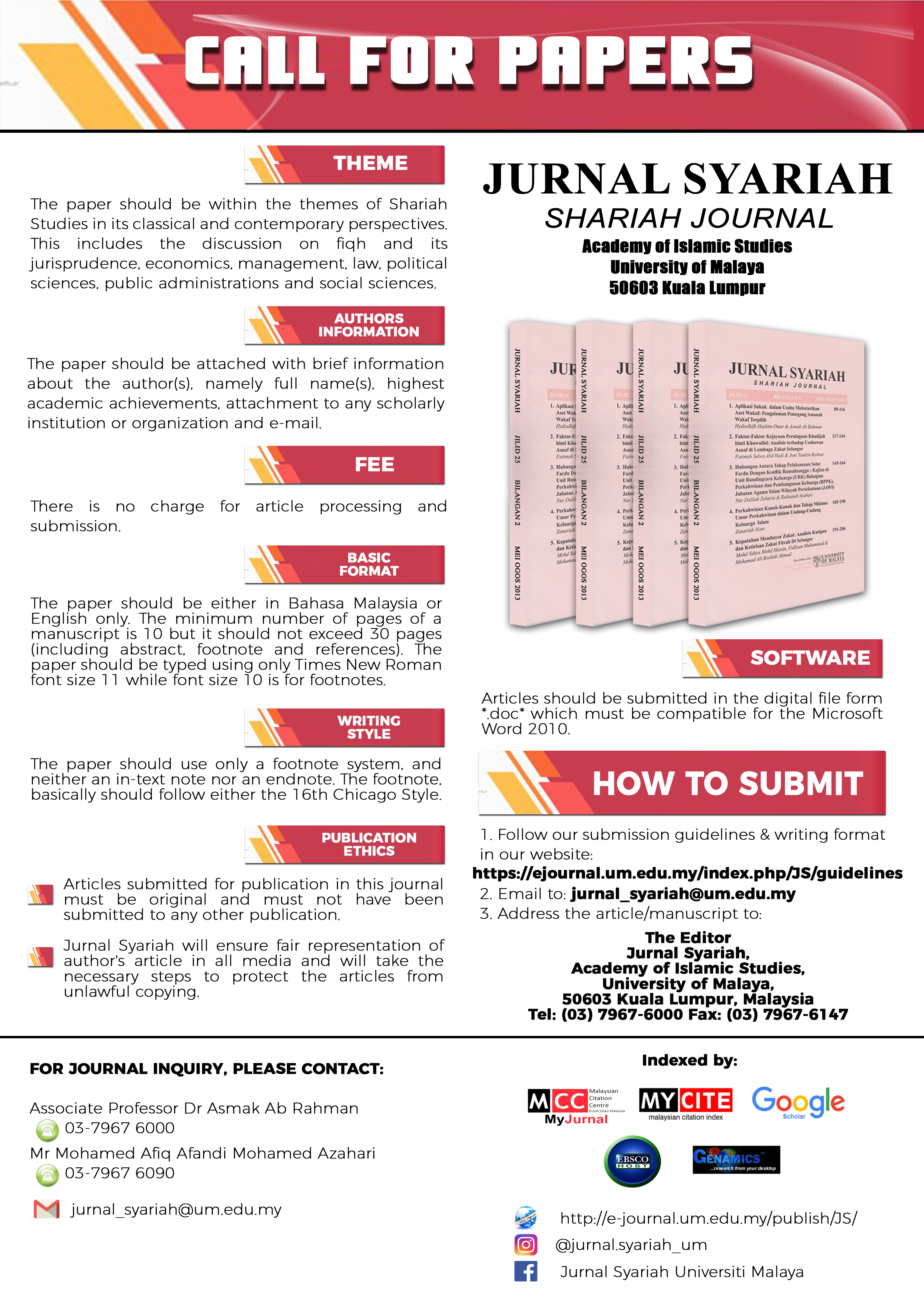INTEGRATING ISLAMIC ECONOMIC PRINCIPLES INTO SOCIAL HEALTH INSURANCE: INSIGHTS FROM THE INDONESIAN EXPERIENCE
DOI:
https://doi.org/10.22452/syariah.vol32no3.4Keywords:
BPJS, social health insurance, healthcare, wakalah, IndonesiaAbstract
This study investigates the intersection of Islamic economics and Indonesia's social health insurance, BPJS Kesehatan, aiming to enhance its sustainability and equity. By examining BPJS through Islamic economic principles, particularly the concept of wakalah (agency), the research explores how this framework can improve the system's operational efficiency and fairness. Wakalah, in this context, signifies the appointment of BPJS as an agent (wākil) by participants to manage healthcare funds according to Shariah principles, emphasizing trust, responsible fund management, and adherence to intended purposes like covering medical expenses. The study further develops a human development model grounded in Maqaṣid al-Shariah (objectives of Islamic law), incorporating exogenous factors like social justice and human rights alongside endogenous factors like education, health, and income. This model analyzes how integrating Islamic economic principles, including wakalah and the potential for a non-profit operational model promoting mutual cooperation, can contribute to more equitable and just healthcare outcomes within Indonesia's unique cultural and religious context, contributing to the broader discourse on faith-based social welfare systems.
Downloads
References
Abbadi, Ahmed, Dr. “Islam Today.” Journal of the Islamic Educational Scientific and Cultural Organization (ISESCO), no. 32 (2016).
Al-Bukhārī, Muḥammad ibn Ismā‘īl. al-Jāmi‘ al-Ṣaḥīḥ (Ṣaḥīḥ al-Bukhārī). Edited by Muḥammad Fu’ād ‘Abd al-Bāqī. Dār al-‘Arabiyyah, 1987.
Al-Ghazāl, Sharīf Kāf. The Origin of Bimaristans (Hospitals) in Islamic Medical History. Foundation for Science, Technology and Civilisation, 2007.
Al-Ghazālī, Abū Ḥāmid. Iḥyā’ ‘Ulūm al-Dīn. 4 vols. Bayrūt: Dār al-Ma‘rifah, 1982.
Al-Marghīnānī, Burhān al-Dīn al-Farghānī. al-Hidāyah: The Guidance. 3 vols. Bayrūt: Dār Iḥyā’ al-Turāth al-‘Arabī, 1997.
Al-Māwardī, Abū al-Ḥasan. al-Aḥkām al-Sulṭāniyyah wa-al-Wilāyāt al-Dīniyyah. al-Qāhirah: Maktabah Dār al-Turāth, 1989.
Al-Nawawī, Yaḥyā ibn Sharaf. al-Majmū‘ Sharḥ al-Muhadhdhab. 6 vols. Bayrūt: Dār al-Fikr, 1996.
Al-Shāṭibī, Ibrāhīm ibn Mūsā. al-Muwāfaqāt fī Uṣūl al-Sharī‘ah. 2 vols. Bayrūt: Dār al-Ma‘rifah, 1997.
Baidhawy, Zakiyuddin. Distributive principles of economic justice: An Islamic perspective. IJIMS, Indonesian Journal of Islam and Muslim Societies, vol. 2, no. 2, December 2012, pp. 241-266.
Braun, V., and V. Clarke. “Using Thematic Analysis in Psychology.” Qualitative Research in Psychology 3, no. 2 (2006): 77–101.
Dalhat, Dr. Yusuf. “Introduction to Research Methodology in Islamic Studies.” Journal of Islamic Studies and Culture. American Research Institute for Policy Development, (2015): 148.
Fatwa of the National Sharia Council of the Indonesian Ulema Council. No: 98/DSN-MUI/IX/2015. Guidelines for the Implementation of Sharia Health Social Insurance.
Haque, Amber. “Psychology from Islamic Perspective: Contributions of Early Muslim Scholars and Challenges to Contemporary Muslim Psychologists.” Journal of Religion and Health 43, no. 4 (Winter 2004): 357–377.
Hassan, M. Kabir. Introduction to Islamic Banking & Finance: Principles and Practice. Pearson Education Limited, 2013, 303–305.
Husain, F. Nagamia. “Islamic Medicine History and Current Practice.” JISHIM, 2003, vol. 2, 23.
Ibn Qudāmah, Muwaffaq al-Dīn. al-Mughnī. Vol. 5. Bayrūt: Dār al-Kutub al-‘Ilmiyyah, 1994, 215.
Imām Mālik. al-Muwaṭṭa’. Book 43, Ḥadīth 23.
Indonesian Law. Article 7 number (1) and number (2), article 9 number (1).
Iskandar, Iskandar, Dadang Irsyamuddin, Esa Dwiyan, and Hidayatul Ihsan. “Waqf Substantial Contribution Toward the Public Healthcare Sector in the Ottoman Empire.” Journal of Critical Realism in Socio-Economics (JOCRISE) 1, no. 3 (2023): 275–294.
Kahf, M. The Economic Role of State in Islam. Lecture presented on Islamic Economics, Dakka, Bangladesh, 1991, p.4.
Kamali, Mohammad Hashim. Principles of Islamic Jurisprudence. Islamic Texts Society, 2003. Chapter 12, "Social Solidarity and the Common Good," pp. 297–320.
Kamali, Mohammad Hashim. Shari’ah Law: An Introduction. Oneworld Publications, UK, 2008.
Khan, F. “How ‘Islamic’ Is Islamic Banking?” Journal of Economic Behavior & Organization 76, no. 3 (2010): 805–820.
Krafess, Jamal. “The Influence of the Muslim Religion in Humanitarian Aid.” International Review of the Red Cross 87, no. 858 (2005): 327.
Nasr, Seyyed Hossein. The Heart of Islam: Enduring Values for Humanity. 2001, p. 3.
Pitzer, John. “The Definition of a Social Insurance Scheme and Its Classification as Defined Benefit or Defined Contribution.” International Monetary Fund, 2003. https://www.imf.org/external/np/sta/ueps/2003/063003.pdf.
Qaraḍāwī, Yūsuf. Fiqh al-Zakāt: A Comparative Study. Dār al-Taqwā. Ltd, 1999. Chapter 4, "The Role of Zakat in Islamic Social Solidarity," pp. 140–165.
Sadr, Sayyid Musa. “Islam, Humanity and Human Values.” Journal of Islamic Studies and Culture 11, no. 4 (Winter 2011): 38.
Ṣaḥīḥ al-Bukhārī 6049.
Ṣaḥīḥ Muslim. The Book of Zakat, Book 5, Number 2148.
Ṣaḥīḥ Muslim. Book 32, Hadīth 6258.
Snape, D., and L. Spencer. “The Foundation of Qualitative Research.” In Qualitative Research Practice: A Guide for Social Science Students and Researchers, edited by J. Ritchie and J. Lewis, 1–23. Thousand Oaks: SAGE Publications, Inc., 2005.
Social Security Administration. Social Security Programs Throughout the World: Asia and the Pacific, 2014. Washington, DC: SSA Publication No. 13-11802, 2015.
Thabrany, Hasbullah. Social Health Insurance in Indonesia: Current Status and the Proposed National Health Insurance. Center for Health Economic Studies, University of Indonesia. Presented in Social Health Insurance Workshop, WHO SEARO, New Delhi, March 13-15, 2003. Revised, August 2003.
Tober, Diane M., and Debra Budiani. “Introduction: Why Islam, Health and the Body?” Body and Society 13, no. 3 (2007): 1–13.
Yusuf Ali Translation. Retrieved http://en.noblequran.org/quran/surah-yunus/ayat-57/ at 10.50 am on the 26th of April, 2016.
Interview
Three experts in Islamic Economics and Health Economics, interview by author, 2023-2024.
BPJS Official Representative, interview by author, 2023-2024.
BPJS users, interview by author, 2023-2024.
Online Source
"2017, Defisit BPJS Kesehatan Rp 9,75 Triliun." Databoks Katadata. https://databoks.katadata.co.id/datapublish/2018/05/17/2017-defisit-bpjs-kesehatan-rp-975-triliun. Accessed June 20, 2022, 9:54 pm.
BPJS Kesehatan. https://bpjs-kesehatan.go.id/bpjs/. Accessed April 19, 2018, 9:30 am.
"Disinformasi Ketua MUI dengan Tegas Bahwa BPJS Haram Baik Secara Prosedural maupun Substansial." Kementerian Komunikasi dan Informatika Republik Indonesia. https://www.kominfo.go.id/content/detail/22134/disinformasi-ketua-mui-dengan-tegas-bahwa-bpjs-haram-baik-secara-prosedural-maupun-substansial/0/laporan_isu_hoaks. Accessed June 30, 2024, 7:58 am.
"Indonesia Striving to Solve Shortage of Specialists Doctors." Antara News. https://en.antaranews.com/news/273918/indonesia-striving-to-solve-shortage-of-specialists-doctors. Accessed August 15, 2024, 3:00 pm.
"Indonesia 2014 Semua WNI Wajib Bayar Iuran BPJS." BUMN. Archived from the original on January 1, 2014. http://web.archive.org/web/20140101005128/http://www.bumn.go.id/jamsostek/id/publikasi/berita/indonesia-2014-semua-wni-wajib-bayar-iuran-bpjs/. Accessed April 19, 2018, 9:40 pm.
"Sejarah BPJS Kesehatan." BPJS Kesehatan. https://www.bpjs-kesehatan.go.id/bpjs/index.php/pages/detail/2010/2. Accessed August 14, 2016, 4:39 am.
"Social Security in Islam." Islamic Research and Training Institute (IRTI). http://www.irfi.org/articles/articles_251_300/social_security_in_islam.htm. Accessed June 29, 2024, 7:51 am.
Undang-Undang Dasar Negara Republik Indonesia Tahun 1945. Mahkamah Konstitusi Republik Indonesia. https://www.mkri.id/public/content/infoumum/regulation/pdf/uud45%20eng.pdf. Accessed June 30, 2024, 8:58 am.
"Why It Matters." DoctorShare. https://www.doctorshare.org/en/why-it-matters. Accessed August 15, 2024, 3:05 pm.
Downloads
Published
How to Cite
Issue
Section
License
Copyright (c) 2024 Jurnal Syariah

This work is licensed under a Creative Commons Attribution-NonCommercial 4.0 International License.
COPYRIGHT: All rights reserved. Not allowed to be reproduced any part of articles and contents of this journal in any form or by any way, whether electronic, mechanical, photocopying, recording or otherwise without permission in writing from the Chief Editor, Jurnal Syariah.



















